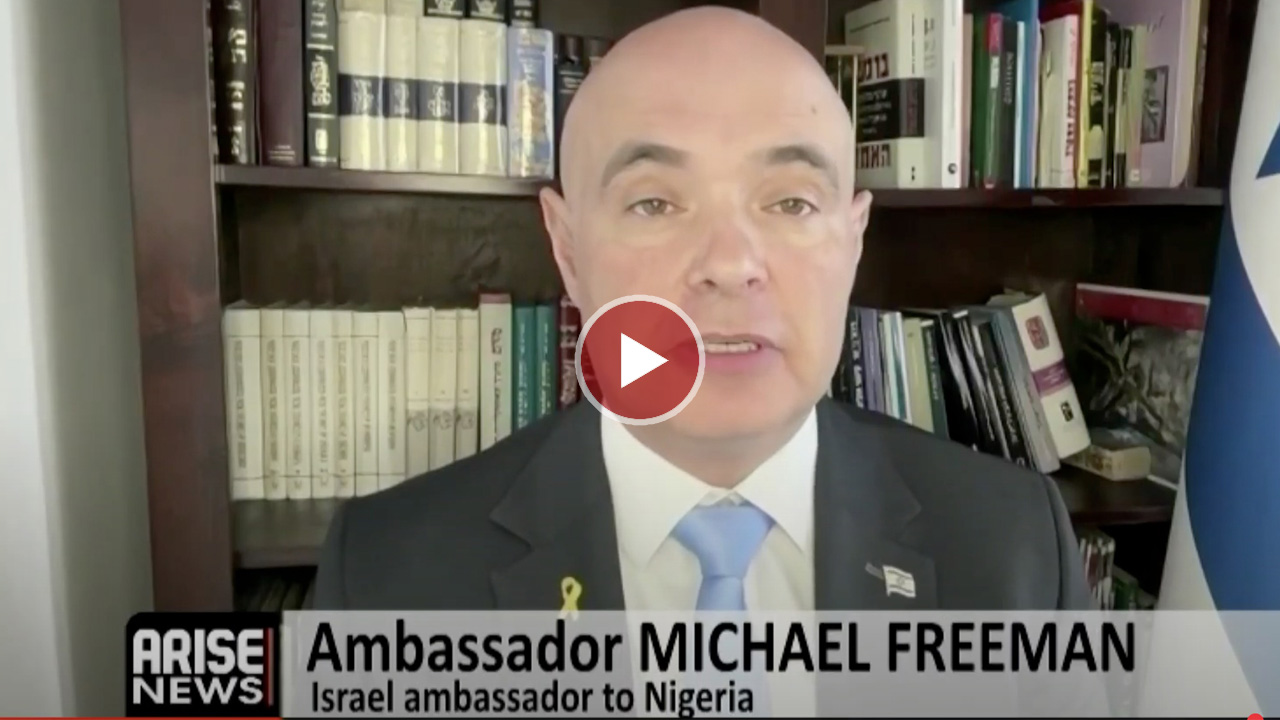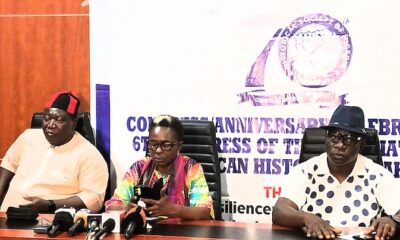Business
Israel’s Ambassador Defends Military Actions Amid Genocide Claims

Israel’s Ambassador to Nigeria, Michael Freeman, has firmly rejected allegations of genocide against Israel, arguing that the casualty ratios from the ongoing conflict in Gaza indicate that the Israeli military has not intentionally targeted civilians. During an interview on ARISE News on January 15, 2024, Freeman highlighted the significant differences between Gaza’s casualty figures and those typically seen in global conflicts.
Freeman stated, “According to the United Nations, in every other war, the number of civilians to combatants killed is normally one combatant to six civilians, or in urban conflict, one combatant to nine civilians. In this case, we’re looking at a ratio of one to one.” He emphasized that this statistic represents a significant deviation from the norm, suggesting the absence of a deliberate campaign against civilians.
The ambassador acknowledged that even using figures released by Hamas—which he deemed unreliable—illustrates a remarkably balanced ratio of combatants to civilians. He cited that if 69,000 Palestinians were killed, as Hamas claims, approximately half of them would be combatants, aligning with various international estimates. “President Trump gave the figure of over 50,000 of them being Hamas terrorists,” he noted.
In his defense, Freeman contended that such numbers undermine the accusations of genocide, maintaining that Israel’s military actions are purely aimed at dismantling Hamas’s capabilities following the group’s attack on Israel. He stated, “The accusation of genocide is absolutely outrageous. It has no basis in fact whatsoever.”
Freeman characterized the situation in Gaza as a conflict forced upon Israel, asserting that the country did not initiate the hostilities. “What’s been going on in Gaza is a war. And unfortunately, in war, people are killed. Wars are a terrible thing. This was a war that Israel didn’t want. It’s a war that Israel didn’t start,” he explained.
The ambassador placed the blame for civilian casualties squarely on Hamas, accusing the group of using civilians as human shields. “They used the civilian population of Gaza as human shields, and they carried out their war against Israel,” he stated, highlighting the tragic consequences of such tactics.
Freeman also took issue with the United Nations Commission’s use of the term genocide, calling it “truly offensive.” He pointed out that the term should not be misapplied to the current conflict, contrasting it with historical genocides. “A genocide was the Holocaust when six million Jews were murdered. A genocide is what happened in Rwanda when a million Tutsis were murdered,” he emphasized.
Looking ahead, Freeman expressed hope that the ongoing ceasefire would pave the way for lasting peace, contingent on Hamas’s willingness to disarm. “If Hamas are willing to lay down their arms and if Hamas are willing to give up power in Gaza, then this ceasefire will hold,” he remarked.
In closing, the ambassador reiterated Israel’s commitment to stability and coexistence, stating, “I want better days for Israelis. I want better days for Palestinians. I want this war to end permanently.” He underscored the necessity for Hamas to relinquish their arms and authority for any meaningful resolution to take place.
-

 Entertainment1 month ago
Entertainment1 month agoAnn Ming Reflects on ITV’s ‘I Fought the Law’ Drama
-

 Entertainment2 months ago
Entertainment2 months agoKate Garraway Sells £2 Million Home Amid Financial Struggles
-

 Health1 month ago
Health1 month agoKatie Price Faces New Health Concerns After Cancer Symptoms Resurface
-

 Entertainment1 month ago
Entertainment1 month agoWhere is Tinder Swindler Simon Leviev? Latest Updates Revealed
-

 Entertainment2 months ago
Entertainment2 months agoKim Cattrall Posts Cryptic Message After HBO’s Sequel Cancellation
-

 Entertainment1 month ago
Entertainment1 month agoCoronation Street’s Carl Webster Faces Trouble with New Affairs
-

 Entertainment2 months ago
Entertainment2 months agoMasterChef Faces Turmoil as Tom Kerridge Withdraws from Hosting Role
-

 Entertainment3 months ago
Entertainment3 months agoSpeculation Surrounds Home and Away as Cast Departures Mount
-

 World1 month ago
World1 month agoCole Palmer’s Mysterious Message to Kobbie Mainoo Sparks Speculation
-

 Entertainment1 month ago
Entertainment1 month agoITV’s I Fought the Law: Unraveling the True Story Behind the Drama
-

 Entertainment4 weeks ago
Entertainment4 weeks agoCaz Crowned Winner of The Great British Sewing Bee, Overjoyed by Triumph
-

 Entertainment2 months ago
Entertainment2 months agoAldi Launches Cozy Autumn Fragrance Range Ahead of Halloween





















